Experience FHI 360
Click above to read about our projects around the globe.
Legal services + livelihoods + early childhood development reduces the impact of HIV
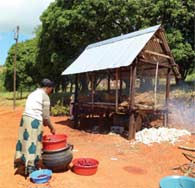
Region: Southern Africa
Swaziland has the highest prevalence of HIV in the world. Through the Community-Based Livelihoods Development (C-BLD) project, FHI 360 is working to reduce the impact of HIV on women and children, which are the populations most affected by the epidemic. In two communities with more than 8,700 people, C-BLD collaborates with national and community partners to train women in legal and financial literacy and early childhood development. It also provides education and training opportunities for youth and mobilizes them to support community development priorities. Capacity building is a key goal: FHI 360 experts train community committees and institutions to understand and advance the rights and interests of women and children. C-BLD also improves access to legal services to help women protect their assets and safeguard the well-being of their dependents. To strengthen household economies, the project promotes savings groups and extends technical and business training to cotton, honey and horticulture producers, linking them with formal markets and the private sector.
Funder: United States Agency for International Development / United States President’s Emergency Plan for AIDS Relief
Environmental protection + small business development spurs economic growth
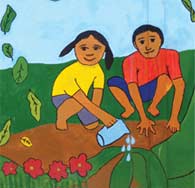
Region: Latin America
FHI 360’s Nicaragua Market-Based Opportunities for Conservation and Sustainable Tourism program educates local tourism entrepreneurs on how to promote sound environmental practices and train other small, rural tourism providers to do the same. Since the program began in 2010, more than 1,000 tourism providers and guides — nearly half of them women — received training in topics ranging from leadership skills and bookkeeping to improving water and sanitation and decreasing pollution on the Rio Jiguina. More than 120 private-sector firms have improved management practices, and participating micro-, small and medium enterprises have experienced a 17 percent increase in revenues. In addition, more than 3,100 Nicaraguans have participated in environmental education initiatives and activities.
Funder: United States Agency for International Development
Scholarships+ mentoring+ teacher development+ community engagement brings more girls into the classroom
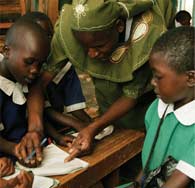
Region: East Africa, West Africa
When you educate a girl, you change not just her life — you transform her family, her community, her nation. The Four Pillars PLUS project in Kenya and Nigeria uses scholarships, professional development for teachers, mentoring and community participation to get girls into the classroom and keep them there. Since its inception in 2008, the project has provided 2,300 primary and secondary school scholarships to girls in Kenya; 264 girls were awarded scholarships in 2012 in Nigeria, where the project is completing its first year. Girls are mentored on issues that help them build life and leadership skills, improve self-esteem and increase their knowledge about proper nutrition and HIV prevention. In Kenya’s 10 participating primary schools, enrollment for girls has increased by 29 percent, and student pregnancy has been eliminated. Moreover, 81 percent of the girls in these schools transitioned to post-primary institutions, outperforming the national average of 67 percent.
Funder: GE Foundation
A dynamic alliance solves a common problem
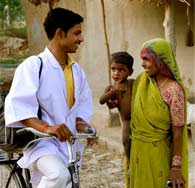
Region: Asia
Low-cost oral rehydration salts (ORS) combined with zinc is the most effective treatment for diarrheal diseases, which cause more than 700,000 deaths each year in children under 5 years of age. In India, more than 80 percent of health care providers are informal practitioners, many of whom lack knowledge about the effectiveness of ORS and zinc. In the states of Gujarat and Uttar Pradesh, FHI 360 connected local pharmaceutical companies willing to produce and market ORS and zinc with civil society organizations willing to educate the providers and act as a sales force. Regular visits to rural medical practitioners, demonstrations and short videos have transformed the way a common childhood illness is treated: The Diarrhea Alleviation through Zinc and ORS Therapy (DAZT) project now regularly reaches more than 27,000 informal practitioners, including those who work in drug shops, in both states to ensure availability of ORS and zinc treatments. As of December 2012, approximately 85 percent of those providers dispensed ORS and 45 percent dispensed a combination of ORS and zinc, a sign that DAZT has fostered an innovative, sustainable solution to a common problem.
Funder: Bill & Melinda Gates Foundation through the United States Fund for UNICEF
Collaboration FOSTERS a vibrant civil society
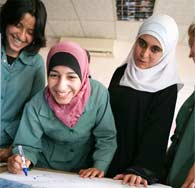
Region: Eastern Europe, Middle East
In Moldova and Jordan, civil society programs are cultivating active citizens who promote good governance and strengthen the capacity of local organizations to respond better to community needs.
Through the Moldova Civil Society Strengthening program, FHI 360 experts have helped more than 150 civil society organizations establish fruitful partnerships that resulted in increased collaboration with the government in planning, decision making and problem solving. Now in its fourth year, the program has helped improve national laws governing civil society organizations by formulating 40 policy recommendations and supporting the passage of a comprehensive, three-year national civil society strategy. Civil society partners have improved their long-term sustainability by increasing their own funding derived from local sources by 16 percent. FHI 360 experts have worked extensively with more than 60 organizations, building skills and knowledge to ensure that they are transparently governed and capably managed. By the end of 2012, civil society partners had engaged more than 50,000 citizens to create local-level change on issues ranging from preventing child abuse to increasing philanthropic activities.
In Jordan, FHI 360 uses a potent combination of technical assistance, capacity building and grant making to support a strong and vibrant civil society and an engaged citizenry. For example, Jordan has attained notable results in the area of disability rights in just a few years, including improved legislation for people with disabilities and a constitutional reference that supports their rights.
Funder: United States Agency for International Development
Early warning system supports students' success

Region: United States
More than one million students in the United States fail to graduate from high school each year.1 Yet recent research shows that certain indicators — attendance, behavior and grades in math and English language arts — can reveal a student’s risk for failing to complete high school. In some of the lowest-income neighborhoods in New York City, FHI 360’s Partnership Support Organization (PSO) is working with schools to create early warning systems using these key indicators. Dedicated PSO staff coach school principals on making smart use of data, understanding how child and adolescent development affects learning, creating small learning communities, and building parental engagement and support so students can thrive in and out of the classroom. While most of the 22 PSO schools are public middle schools, the PSO expanded in 2012 to elementary and high schools to meet the demand for quality services and now reaches more than 8,700 students.
1Education Week.
Funder: New York City Department of Education
Evidence equips partners to lead policy change
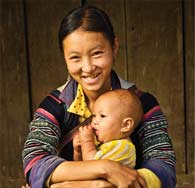
Region: Asia Pacific
Breastfeeding, along with complementary feeding, can save about a million lives each year. In June 2012, the National Assembly in Vietnam passed landmark legislation extending paid maternity leave from four to six months. Maternity leave was one of the top reasons Vietnamese mothers cited for not breastfeeding exclusively for the first 6 months of life, as recommended by the World Health Organization. Through the Alive & Thrive project, FHI 360 experts supported the policy change for maternity leave by building strong partnerships, documenting evidence for exclusive breastfeeding and finding ways to reach key stakeholders — particularly working women. Additional legislation approved a ban on the advertisement of breast milk substitutes for children younger than 24 months and other food products for children under 6 months of age. The new policies help to ensure Vietnam’s children get the best start in life.
Funder: Bill & Melinda Gates Foundation
Effective education systems serve children and communities
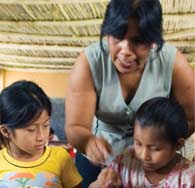
Region: South America
The Quality Basic Education Reform Support project in Peru has helped the central and regional governments drive education decision making to local levels, thereby empowering communities to improve and maintain quality in their schools. The project provides technical assistance to governments that are working to scale up the active schools approach, which promotes teaching strategies — such as self-paced learning guides, small group work, learning corners and participation in school government — to improve student achievement. Support includes developing materials, creating demonstration schools and training coaches who provide teachers with professional development. Overall, the project has reached more than 2,000 teachers and 37,000 students in four regions. Schools that adopted the project’s detailed learning guides showed impressive reading gains: Between 2009 and 2011, second graders reaching mastery level in reading tripled from 6 percent to 19 percent, while the percentage of nonreaders decreased from 33 percent to 19 percent.
Funder: United States Agency for International Development
Farmers learn to improve productivity through video and radio

Region: Africa
Having access to up-to-date information on planting methods, market prices, weather and disease is crucial for smallholder farmers in Africa. Through the Fostering Agriculture Competitiveness Employing Information and Communication Technologies (FACET) project, FHI 360 is demonstrating how existing technologies can be used to share timely and accurate information to improve productivity and earnings. In May 2012, FHI 360 launched a low-cost video toolkit to share agricultural information and trained nearly 200 people from 11 countries in Africa on its use, including farmers groups, government ministries, local and international nongovernmental organizations and agribusinesses. By the end of 2012, the video toolkit had been accessed online more than 1,500 times. FACET also published a second toolkit to help practitioners leverage mobile phones to transform rural radio from a one-way information source to a two-way exchange of sharing and learning. FHI 360 is now looking to apply FACET’s successful strategies in other areas, such as health, civil society and education.
Funder: United States Agency for International Development
New curriculum revolutionizes teaching and learning
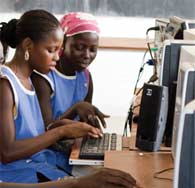
Region: West Africa
The award-winning Education de Base (EDB) project is improving the quality of education in Senegal by implementing a new, national middle-school curriculum that promotes critical thinking and equips students with the skills they need to succeed in today’s global economy. The project, which embodies Senegal’s reform efforts, has become a model for teaching and learning in each of the country’s 1,200 middle schools. EDB harnesses the power of technology by equipping nearly 300 middle schools with computers, connecting them to the Internet and training teachers and students to use these tools in the classroom. Each of these schools has a website, which is managed by students and teachers and provides a powerful way to communicate with their communities. To date, more than 33,000 students, 3,000 teachers and 300 principals are integrating information and communication technology into teaching, learning and school governance.
Funder: United States Agency for International Development
A novel device helps prevent HIV

Region: Global
Circumcising 20 million men in sub-Saharan Africa by 2015 could prevent 3.4 million HIV infections, but by March 2012, only 1.5 million men had received voluntary medical male circumcision services. In sub-Saharan Africa, FHI 360 is collaborating with EngenderHealth and Weill Cornell Medical College to assess the ShangRing — a novel device for performing male circumcision that uses no stitches and results in little or no bleeding. In 2012, FHI 360 and its partners completed a series of studies in Kenya and Zambia showing that the method was as safe as conventional surgery and offered an easier, faster procedure with higher rates of client satisfaction. An independent committee will review the study results and make recommendations to the World Health Organization on whether to endorse wider use of the ShangRing.
Funder: Bill & Melinda Gates Foundation
Early testing of new long-acting contraceptive for increased access and choice
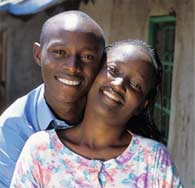
Region: Global
More than 40 million women worldwide use injectable contraceptives, which are currently effective for one to three months depending on the product. In sub-Saharan Africa, more than a third of contraceptive users choose injectables. Despite the method’s popularity, discontinuation rates, particularly in developing countries, are high and often due to missed follow-up appointments. FHI 360 is supporting the identification and early testing of innovative approaches for an injectable that would last six months. The first phase of the project, completed in 2012, identified a number of promising concepts. In the next phase, several of those will advance to proof-of-concept testing — a first step toward expanding contraceptive access and choice for women around the world.
Funder: Bill & Melinda Gates Foundation
Data improves access to care and services
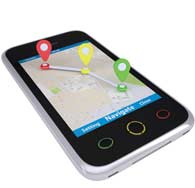
Region: United States
In the United States, FHI 360 created a new tool that uses geographic information system technology to map the population density of nearly 50,000 veterans in three communities. The project plotted veterans’ proximity to existing services, such as health care centers, substance abuse treatment facilities and homeless shelters, to ensure that they are able to access care when they need it. The U.S. Department of Veterans Affairs (VA) is now sharing the tool with individual VA medical centers to help decision makers and the broader VA community address public health issues, including pandemic influenza.
Funder: United States Department of Veterans Affairs
Research helps prevent pandemics

Region: Africa, Asia
In Africa and Asia, PREVENT project researchers are studying how humans interact with animals and how those behaviors increase the risk of disease crossing between animals and humans. Putting this evidence to work in Bangladesh, FHI 360 experts developed a program to discourage villagers from drinking raw sap from date palm trees — which is often contaminated by bats — to reduce the risk of infection from the Nipah virus. FHI 360 also trained epidemiologists from more than 20 countries on how to communicate the risks of emerging pandemic threats.
Funder: United States Agency for International Development / Australian Agency for International Development
Classrooms are transformed to promote learning
Region: Eastern Europe
What does a 21st century teaching and learning space look like? Cheerful, modern and student centered. Schools in Kosovo are being transformed with the help of FHI 360’s Basic Education Program. The program supports the Kosovo government to improve school management, student assessment and teacher training. Classroom makeovers began in 2011 with six classrooms in six schools. Local businesses donated materials and labor, families and students contributed their time and the Basic Education Program supplied table tops, display boards and paint. The makeovers are just one component of the project and are complemented by teacher professional development activities, which are designed to equip teachers with tools to improve and modernize their instructional practices. Parental and community engagement are crucial to the program’s success and increases active participation in children’s education. By the end of 2012, 52 schools had classroom makeovers, resulting in learning spaces that put students first.
Funder: United States Agency for International Development
Research on youth reaches those who need it most
Region: Global
Nearly 2,500 youth around the world become infected with HIV each day, and 16 million girls under age 18 give birth every year. Research evidence that could improve the sexual and reproductive health of young people, however, takes a decade or more to be put into practice. FHI 360 helps close this research-to-practice gap by managing the content of the Interagency Youth Working Group (IYWG), funded by the U.S. Agency for International Development. FHI 360 develops tools and resources that put evidence-based information into the hands of policymakers and practitioners who can use it to make a difference in young people's lives. From March 2012 to June 2013, the IYWG website had more than 15,000 visits, and the blog had more than 16,000 views. IYWG's past four e-forums were attended by 2,400 participants around the world, and its e-newsletter is distributed twice monthly to more than 5,000 people. There are more than 1,000 IYWG Twitter followers who are linked to key research articles and publications.
Funder: United States Agency for International Development
Information sharing supports best practices
Region: Middle East, North Africa
The Regional Partnership on Culture and Development (RPCD) was started in 2010 to foster collaboration and support for cutting-edge research on best practices in the Middle East and North Africa. To facilitate information sharing, RPCD created the Partnership Forum, a network of over 150 research and advocacy organizations in countries where the U.S. Agency for International Development (USAID) works. At the regional level, the partnership has sponsored five events to link members for knowledge exchange and joint action. At the national level, RPCD engages members in trainings on research approaches and strengthens their capacity to provide research to policymakers. The RPCD Portal, which has had 8,900 unique visitors, hosts a digital library that brings up-to-date research with a regional focus to forum members and USAID staff. Finally, through 12 webinars, a YouTube channel and a Facebook page, the forum enables members to share their own research and connect with counterparts in other countries.
Funder: United States Agency for International Development
Universities are connected to promote long-term collaboration
Region: Middle East
Long-term and self-sustaining university-to-university partnerships are at the heart of the Iraq University Linkages Program. The program connects four universities in Iraq with four in the United States. Staff and faculty from each university collaborate to modernize curricula and teaching practices, conduct faculty and student exchanges, author joint research papers and engage in online academic communities and video conferencing. Departmental partnerships from the University Linkages Program include English education, petroleum studies, engineering, computer science and business. Program staff also guided the establishment of first-of-its-kind career centers at each Iraqi university to connect students with the country's growing private sector. This fall, the program will feature a third installment of career-center staff training along with a sustainability conference involving leadership from all eight university partners.
Funder: United States Department of State/United States Embassy, Baghdad
FANTA helps countries meet nutrition and food security needs
Region: Global
The Food and Nutrition Technical Assistance III (FANTA) project provides technical assistance to the U.S. Agency for International Development and its partners in 14 countries in Africa, Asia and Latin America to strengthen nutrition and food security policies, programs and systems. FANTA works across multiple sectors to promote sustainable results. For example, in Bangladesh, FANTA provided support to develop and implement a strategy to integrate nutrition into clinic services and trained clinic staff on infant and young child feeding. In Ethiopia, FANTA collaborated on national nutrition and HIV guidelines and curricula for medical and nursing schools. And, in Guatemala, FANTA began work to enhance the nutritional impact of agriculture interventions. To help countries strengthen their capacity in nutrition, FANTA held 99 trainings in 2012 for more than 2,300 people in nine countries on such topics as infant and young child feeding; on-site nutrition, assessment, counseling and support training; monitoring and evaluation; and community-based management of acute malnutrition. FANTA also conducts research to test and validate new and promising approaches and contribute to the evidence base. Findings from a study funded by FANTA and published in 2012 on the use of antibiotics to treat children with severe acute malnutrition was described as a “major new scientific finding” by the New York Times, which reported on the potentially lifesaving results.
Funder: United States Agency for International Development
Private-sector partnership prepares young people for careers in health care
Region: Global
Increasing interest in and reducing barriers to entering the health care workforce are central to Johnson & Johnson’s Bridge to Employment (BTE) program. Managed by FHI 360, BTE has over the past 20 years established sites in 65 high-need communities throughout Africa, Asia, Europe, Latin America and the United States. In 2012, the 15 corporately funded sites — partnerships between 23 local Johnson & Johnson companies, 19 secondary schools and 17 higher education institutions — provided more than 500 students a variety of activities that promote high standards of learning and connect students with the workplace, including career coaching, shadowing or internships. An additional 1,800 youth also gained valuable exposure to careers in science, technology, engineering, math and health through school-wide guest lectures and workshops. The efforts are paying off: BTE graduates in 2012 obtained higher grades over a comparison group (about 12 percent), were accepted to colleges and universities (100 percent) and plan to pursue a health career (62 percent).
Funder: Johnson & Johnson
Breaking the cycle: Small doable actions in WASH to improve child health
Region: East Africa
ROADS II: Communities pave the way for lasting change
Region: East / Southern Africa
Philadelphia Postsecondary Success Program
Region: United States
PROGRESS: Empowering women for a brighter future
Region: Global
MTBT: Nutrition Today, Health Tomorrow
Region: Asia Pacific
Timely, reliable data improves education system in Djibouti
Region: East Africa
© Copyright 2013, FHI 360 | www.fhi360.org